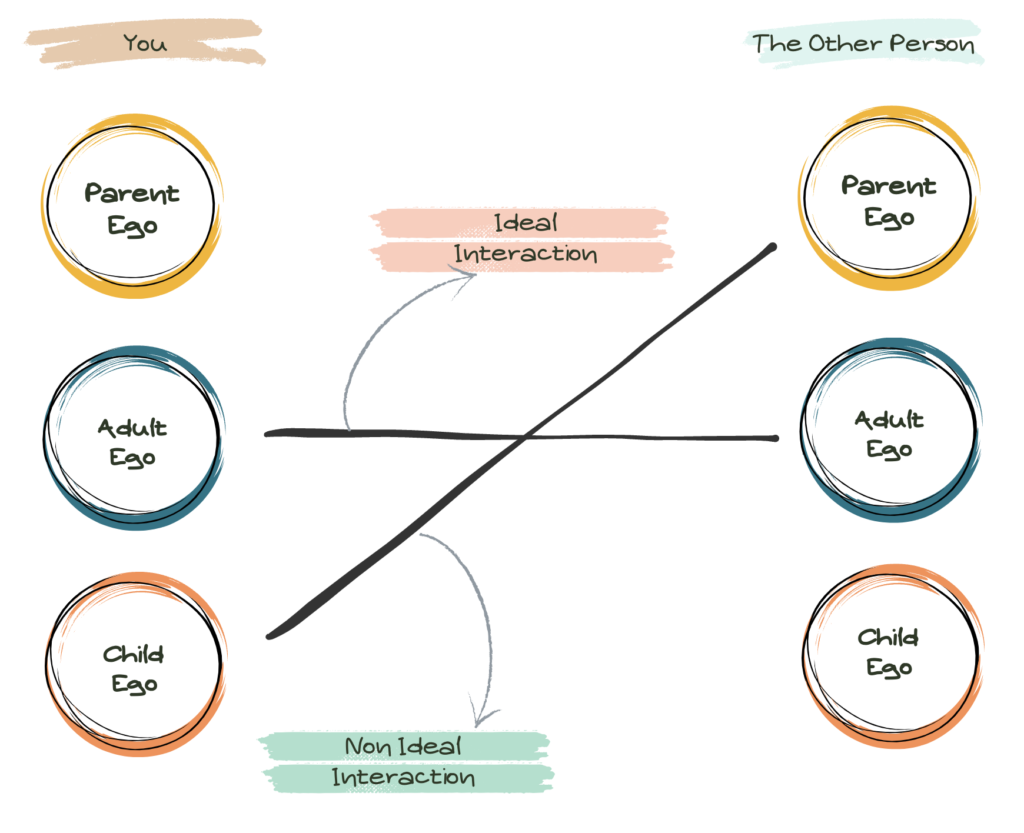Transactional Analysis (TA), is a psychological theory developed by Eric Berne in the 1950s. The framework is centered around the 3 egos that exist within us, and how they play out in both our inner and outer worlds.
The Child Ego, the Parent Ego, and the Adult Ego.
I found this concept to be easily digestible and a means of understanding the subtleties of our interactions, and how they shape the patterns in our lives. The idea is that a transaction occurs when these ego states interact. Depending on which ego is in the driver’s seat will determine the interactions you have with yourself and others.

The best example of this is getting feedback or help from a colleague. If both of you engage in this interaction from an Adult Ego state, then your transaction with each other is smooth, efficient, and harmonious. On the other hand, if you allow your Child Ego to take the reins, instead of viewing it as constructive feedback, you could misinterpret it as criticism, putting you on the defensive. I’ve definitely been guilty of this one.
Understanding The 3 Egos
The Child Ego
Reacting to situations based on these deeply ingrained patterns. The Child Ego is fragile. It’s like you’ve got this inner child, innocent and curious, yet also carrying the scars and impressions of your upbringing. This Ego reacts emotionally, sometimes without even realizing why. It’s where your fears, insecurities, and desires reside. It’s the part of you that loves to play the blame game. Pointing fingers at others or the past for how you feel or behave today.
The 2 Types of The Child Ego
The Free Child: Young, Wild, and Free. This is the carefree, spontaneous side of you that embraces creativity and playfulness. Think of the exhilaration you feel when pursuing an activity or hobby without any agenda. That’s the Free Child in action.
The Adapted Child: On the other end, the Adapted Child is shaped by learned behaviors from your past. Compliance or rebellion, depending on the situation, reflects the Adapted Child’s responses. The Adapted Child adheres to learned behaviors, shaped by past experiences that have not been analyzed or revisited since its forming.
The important thing to understand about the Child Ego is that you can’t let this child run the show. You’ve got to step into the role of the Adult Ego. The part of you that can observe these patterns, understand them, and ultimately, transcend them. It’s about taking responsibility for your thoughts, feelings, and actions. Then acknowledging to yourself, that you have the power to rewrite the narrative.
You’re not just a product of your past—you’re the creator of your future.
The Parent Ego
The Parent Ego, much like its name suggests, is like the authoritative figure within your mind. The one that lays down the law, sets the rules, and often bases its judgments and behaviors on learned patterns from past authority figures.
It’s like that inner voice that says, “You should do this” or “You shouldn’t do that“. Mimicking the directives of past authoritative figures. It’s the voice that can “should” you to death.
The 2 Types of The Parent Ego
The Nurturing Parent: This voice provides you with a comforting and supportive presence. It’s learned behavior is from what you experienced in your past. If you had authority figures that encouraged you and fostered a sense of security and warmth, you’re most likely to replicate that through your Parent Ego. Even the mere fact of recalling uplifting words during a challenging situation can invoke the Nurturing Parent to take the reins.
The Critical Parent: On the flip side, the Critical Parent mirrors the stern voices of authority figures whose judgments may still linger in your psyche. This ego can manifest when you find yourself harshly criticizing your actions or encountering external judgments. Having a knee-jerk reaction to any form of feedback. The thing with this Critical Parent Ego is that it can be outdated or a bit too rigid. It’s like having an old-school teacher who’s stuck in their ways and doesn’t quite get the modern world. When this happens, it can lead to inner conflict and self-limiting beliefs. The Parent Ego is about becoming aware of these old patterns and outdated beliefs. Then consciously choose to rewrite them instead of allowing them to dictate your actions.
Part of mastering the Parent Ego is understanding what beliefs are outdated programming and when nurturing programming is needed. By acknowledging your Parent Ego and identifying how this ego interacts with you, you’ll be able to re-write the systems in place. Creating a new Parent Ego that’s more aligned with who you want to be.
The Adult Ego
And finally, the Adult Ego is the Gandolf within all of us. The rational, logical part of our psyche, the objective thinker in this ego triad. It processes information in the present, free of any emotional baggage from the past. It’s the voice of reason within you that focuses purely on the present moment. It observes, analyzes, and responds with the wisdom and insights gathered from the past minus the emotional charge. This is ideally where you want to live. The Adult Ego is the place where we can make our best judgment calls. Where we can live freely in the present moment without the baggage of the past or anxieties of the future.
When you’re operating from the Adult Ego, you’re not getting tangled up in old patterns or knee-jerk reactions. Instead, you’re assessing situations objectively, drawing from your knowledge and experience to respond in a balanced and mature manner. It’s about taking responsibility for your actions, owning your choices, and dealing with life’s challenges with clarity and composure.
Developing and maintaining this Adult Ego isn’t always a walk in the park. It takes practice, self-awareness, and a willingness to step back and observe your own thoughts and behaviors. However, when you can tap into the Adult Ego consistently, you’ll find yourself navigating life with a whole new level of grace and wisdom.

Why I Love This Concept
What’s great about Eric Berne’s framework, is that it offers not just a theoretical concept but a practical tool for understanding the complexities of human interaction and the internal dialogues that shape our lives. It doesn’t just help you understand your behaviors but provides a roadmap on how to grow and develop as an individual. Allowing you to reassess your thoughts, behaviors, and relationships. Bringing awareness to these 3 Egos, allows you to drop the stories of your past, consciously creating a different future. Not allowing life to happen to you but for you.
